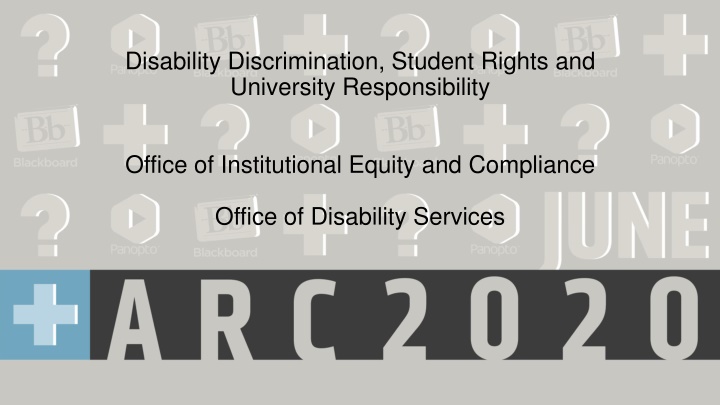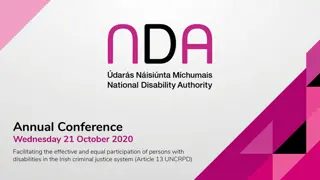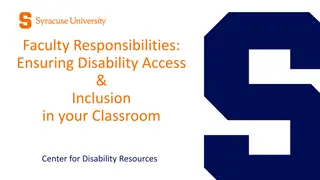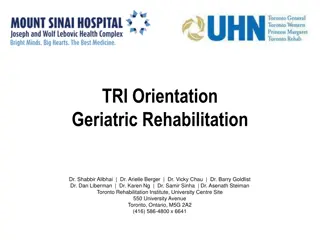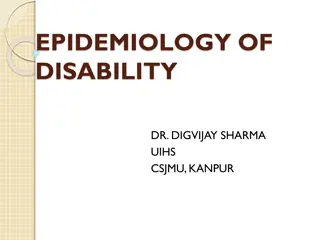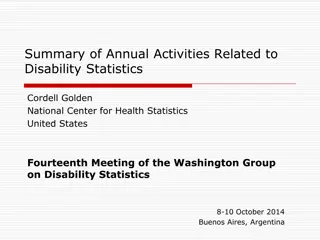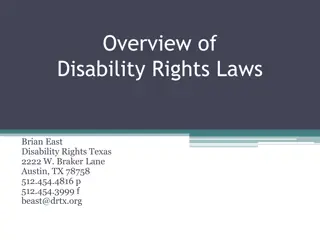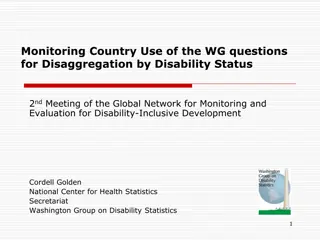Ensuring Disability Rights in University Settings
Explore the vital information regarding disability discrimination, student rights, and university responsibilities, focusing on laws such as the Americans with Disabilities Act (ADA) and Section 504 of the Rehabilitation Act. Learn about the Office of Institutional Equity and Compliance, accommodation requirements, common disabilities, and the importance of making reasonable modifications for equal access in educational environments according to WSU policies.
Download Presentation

Please find below an Image/Link to download the presentation.
The content on the website is provided AS IS for your information and personal use only. It may not be sold, licensed, or shared on other websites without obtaining consent from the author.If you encounter any issues during the download, it is possible that the publisher has removed the file from their server.
You are allowed to download the files provided on this website for personal or commercial use, subject to the condition that they are used lawfully. All files are the property of their respective owners.
The content on the website is provided AS IS for your information and personal use only. It may not be sold, licensed, or shared on other websites without obtaining consent from the author.
E N D
Presentation Transcript
Disability Discrimination, Student Rights and University Responsibility Office of Institutional Equity and Compliance Office of Disability Services
Agenda O.I.E.C Law and Policy Accommodation Requirements University Responsibility OIEC Process O.D.S Common Disabilities Common Accommodations Accommodation Process
Office of Institutional Equity and Compliance The Office of Institutional Equity and Compliance is committed to preventing and eliminating discrimination or harassment based on race color, national origin, pregnancy, sex, age, disability, creed, religion, sexual orientation, gender identity, gender expression, veteran status, or political philosophy.
Laws - 1 Americans with Disabilities Act (ADA) Law prohibiting discrimination based on disability. Guarantees equal opportunity in public accommodations, employment, transportation, state and local government services, and telecommunications Defines a person with a disability as a person who has a physical or mental impairment that substantially limits one or more major life activity.
Laws - 2 Section 504 of the Rehabilitation Act of 1973 (504) No otherwise qualified individual with a disability in the United States . . . shall, solely by reason of her or his disability, be excluded from the participation in, be denied the benefits of, or be subjected to discrimination under any program or activity receiving Federal financial assistance
WSU Policy - 1 Policy 3.47 Prohibits bias, unjust, or prejudicial treatment that limits an individual's or group s ability to participate in or benefits from the University's educational programs, activities or employment based on a Protected Characteristic. Policy lists disability as a protected characteristic.
WSU Policy - 2 Policy 8.10 Wichita State University will make reasonable modifications to the environment, policy and practice and/or provide auxiliary aids and services when the Office of Disability Services determines such modifications are needed for equal access.
University Responsibility Establish and publish procedures for receiving accommodations (Policy 8.10) Prohibit and prevent discrimination against persons with disabilities (Policy 3.47, O.I.E.C) Assure equal educational opportunity via academic adjustments (Faculty and O.D.S) Work with student to identify appropriate & effective accommodations (Faculty and O.D.S)
Not Required Proactively identify students who require services Provide services without appropriate documentation or procedural steps Lower or substantially modify essential requirements Provide accommodations if it creates an undue hardship on the institution
Undue Hardship An action requiring significant difficulty or expense. Considers the nature and cost of proposed accommodation as well as the size and resources of the university. Case-by-case determination. University must try to identify another appropriate accommodation if proposed accommodation is deemed an undue hardship.
O.I.E.C Process Allegation of disability discrimination Preliminary Review Formal Investigation Findings of Fact and Conclusion Appeal Remedial Action if Warranted
Elements of Discrimination 1. Individual is a member of a protected class. (Individual has a disability) 2. Individual suffered an adverse action. (Failure to accommodate or inadequate adjustments made) 3. Action caused the individual to be deprived of educational access, benefit or opportunity.
O.I.E.C Review 1. Individual is a member of a protected class. Has the student provided notice of disability status and the need for accommodations? Has the student followed University process and provided documentation to verify disability with ODS? Was notification provided to faculty?
O.I.E.C Review - 1 2. Individual suffered an adverse action. Did student and faculty both work to identify an appropriate and effective accommodation? Was an accommodation deemed an undue hardship? If so, why? Were other accommodations attempted?
O.I.E.C Review - 2 3. Action caused the individual to be deprived of educational access, benefit or opportunity. How was the student negatively impacted? What, if any, action can be taken to remedy the harm?
O.I.E.C Staff Christine Taylor, J.D., LL.M. Director of O.I.E.C christine.taylor@wichita.edu (316) 978-3205 Michael Irvin, J.D., MPA. EO Coordinator michael.irvin@wichita.ed u (316) 978-3186 Sara Zafar, J.D. Title I X Coordinator sara.zafar@wichita.edu (316) 978-5177
Office of Disability Services - 1 Disabilities The National Organization on Disabilities reports that more than 54 million Americans have a disability. People with disabilities are the nation's largest minority, and the only one that any person can join at a moment's notice. Those who were not born with a disability have about a 20 percent chance of becoming disabled at some point during their life.
Office of Disability Services - 2 Who is disabled under the Americans with Disabilities Act? This civil rights legislation passed in 1990, along with the appropriate regulations and the 2010 amendments, provides the guidelines for determining who is disabled: an individual who has a physical or mental impairment that substantially limits a major life activity, has a record of such a disability, or is regarded as having a disability. These life activities include, but are not limited to learning, working, walking, breathing, hearing, and seeing, in addition to many other physical and sensory functions. If an individual qualifies as being disabled, accommodations can be put in place to address his/her specific needs.
Office of Disability Services - 3 Who determines the accommodations that will be provided? At Wichita State University, the Office of Disability Services under Student Affairs sets the standards and determines the reasonable accommodations that may meet the needs of students with disabilities. The process requires professional documentation of the disability, description of the functional limitations of the student as a result of the disability and the manner in which the disability issue will be addressed. The purpose of the accommodation is to provide equal access to programs and services while preserving academic standards.
Medical Arm and foot injuries (temporary) Asthma/Allergies Back Injuries Cancer/Lymphoma Carpal Tunnel Celiac Disease Cerebral Palsy Chronic Fatigue Syndrome Crohn's Disease, Lupus Cystic Fibrosis Diabetes Hand/Arm Amputee Migraines Multiple Sclerosis Muscular Dystrophy Osteoarthritis Quadriplegia Speech impairment Spina Bifida Thyroid Disease
Psychological ADHD Alcohol/Drug Addiction Antisocial Disorder Anxiety Disorder Autism Spectrum Disorder Depression Obsessive Compulsive Disorder Paranoia Post Traumatic Stress Disorder Schizophrenia TBI (Traumatic Brain Injury)
Other Learning Disabilities Deaf and Hard of Hearing Speech Impairment Vision Impairment
Testing Accommodations Testing (extended time) Distraction-reduced testing environment Private testing environment Group testing environment Rest breaks during exams Use of a computer Use of a calculator Flexibility with exams and due dates Spelling assistance on exams
Classroom Accommodations Use of a Sign Language Interpreter Accessible classroom (ADA Table) Ability to stand in class Note Taking Record class lectures and discussions Accessible media Reserved seating Lab partner Flexibility with attendance Ability to leave classroom/restroom Seizures Dietary accommodations Service animal (classroom, testing, and housing) Accessible text (braille, pdf etc.) Diabetic episodes (testing and classes) Sign Language Interpreters Transcribing/Writing Emergency evacuation assistance (classroom)
Academic and Non-Academic Accommodations Academic Priority class registration Reduced course load Substitution for foreign language requirement Non-Academic Emergency evacuation assistance (Housing) Single room Assistance Animal (ESA) Golf Carts Walking Escorts
Office of Disability Services Accommodations are an interactive process most of the time. Faculty: They are teaching the class. They bring to the table the knowledge of the course requirements, content and methods. Disability Services: They have been provided the documentation of the disability. They have an understanding of what accommodations are appropriate and what functional impairments are caused by the disability. Students: Have an understanding of their disability and how it impacts their learning. What is needed is flexibility and patience to meet the needs of all.
ODS Contact Information Office of Disability Services Location: Grace Wilkie Hall room 203 Phone: 316-978-3309 Email: disability.services@wichita.edu
Dos and Donts of Supporting Students* DO Confer with the student with a disability as to the accommodations most appropriate for him/her/them. *American Psychological Association: https://www.apa.org/pi/disability/dart/legal/ada-basics
Dos and Donts of Supporting Students DO Treat students with disabilities with the same courtesies you would afford to other students.
Dos and Donts of Supporting Students - 1 DO Respect the privacy of students with disabilities. They need not disclose their disability to fellow students. Treat disability information which has been disclosed to you as confidential.
Dos and Donts of Supporting Students - 2 DO Assist students in following the university s policies, such as requirements that all requests for accommodation be lodged with the Office of Disability Services and not individual faculty members alone.
Dos and Donts of Supporting Students - 3 DON T Make assumptions about a student s ability to work in a particular field.
Dos and Donts of Supporting Students - 4 DON T Engage in philosophical debates about fairness to other, nondisabled students, or whether providing accommodations somehow violates academic freedom.
Dos and Donts of Supporting Students - 5 DON T Decide not to provide reasonable accommodations or the academic adjustments which have been approved by the university.
Dos and Donts of Supporting Students - 6 DON T Refuse to permit students to tape record lectures as an accommodation. Refuse to provide copies of handouts, or orally describe information written on the whiteboard, or face the class when referring to something written on the chalkboard, etc., if these accommodations have been determined to be appropriate for a student. Refuse to provide extended time for tests on the mistaken assumption that doing so would require that all students be given additional time.
Dos and Donts of Supporting Students - 7 DON T Refuse to provide accommodations until you have personally evaluated a student s documentation of disability.
Conclusion Questions?
